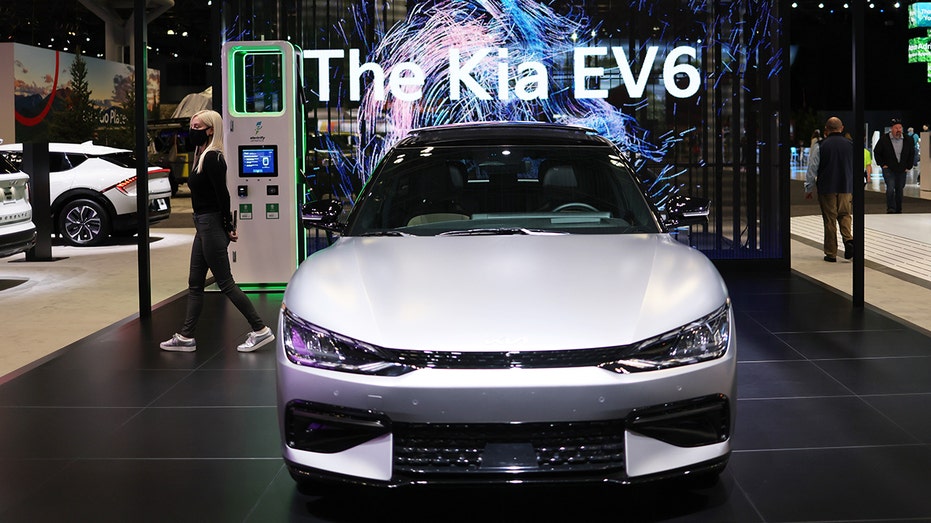First-time EV owner shares ‘cautionary tale’ after it took 15 hours to drive 178 miles
Colorado electric vehicle driver Alan O’Hashi was ‘rudely awakened’ by his car’s slow charging infrastructure
First-time EV owner shocked after it took 15 hours to drive 178 miles
'On the Trail: Electrical Vehicle Anxiety' author Alan O'Hashi argues electric vehicles lack adequate infrastructure for longer distance car rides.
After Colorado resident Alan O’Hashi purchased his all-electric Nissan Leaf -- and became a first-time electric vehicle (EV) owner -- he thought he was ready to embark on the first leg of a 2,600-mile road trip across Wyoming.
But the eager traveler was faced with a harsh truth after a 178-mile route took 15 hours to complete, when normally it would clock in at two-and-a-half hours.
"I was rudely awakened when I determined that the charging wasn't as rapid as some people would lead you to believe, likely the dealers," O’Hashi said in an interview on "Varney & Co." Friday, "and I think people like myself, we go into it a bit blindly."
O’Hashi blames the road bump on a combination of part user error and part "lack of adequate infrastructure" in the car’s charging capabilities.
"I had done some research. I knew a little bit about electric vehicles, and the charging and potential obstacles, and I did some pre-planning for the trip," O’Hashi said, "but I didn't actually have any practical experience with that."
ELECTRIC VEHICLES AND CHARGING STATIONS FUEL CYBERSECURITY CONCERNS

Colorado resident Alan O'Hashi was "rudely awakened" by the lack of charging infrastructure on his electric vehicle, the EV owner said on "Varney & Co." Friday, November 4, 2022. (AP Newsroom)
Deciding to stick with the original plan, O’Hashi took notes detailing the trials and tribulations of long-distance road trips in electric vehicles and published his travel log in a book titled, "On the Trail: Electrical Vehicle Anxiety."
"It is a cautionary tale, and [tells] how people just need to realize the current limitations and what the potential is for the future," the EV owner said.
Similar to O’Hashi, The Wall Street Journal’s Rachel Wolfe thought a drive from New Orleans to Chicago and back in a brand-new Kia EV6 she rented would be "fun."
"Given our battery range of up to 310 miles, I plotted a meticulous route, splitting our days into four chunks of roughly seven and a half hours each. We'd need to charge once or twice each day and plug in near our hotel overnight," Wolfe wrote.
Democrats' electric vehicle push 'coming for you': Energy expert
Western States Petroleum Association Vice President Kevin Slagle on how California's electric car mandate can stress the power grid.
But after the four-day trip was over, Wolfe claimed she spent more time charging the vehicle than she did sleeping.
"It turns out not all ‘fast chargers’ live up to the name. The biggest variable, according to State of Charge, is how many kilowatts a unit can churn out in an hour," Wolfe explained in her op-ed. "To be considered ‘fast,’ a charger must be capable of about 24 kW. The fastest chargers can pump out up to 350. Our charger in Meridian, [Mississippi] claims to meet that standard, but it has trouble cracking 20."
Neither Wolfe nor O’Hashi sounded dedicated to the idea of taking an electric vehicle on another long-distance trip.

The Wall Street Journal's Rachel Wolfe drove a Kia EV6 from New Orleans to Chicago and back. (Getty Images)
"Fumes never smelled so sweet," Wolfe thought when filling up her 2008 Volkswagen Jetta with gas after returning home.
"There are other vehicles I could have purchased that were much more expensive that would have made my travels a lot easier, but not everybody can fall into that category," O’Hashi said. "So I had to face some limitations based on the charging infrastructure."
In an effort to increase the number of reliable charging stations nationwide, the U.S. Department of Transportation proposed standards and requirements earlier this year for EV charging projects funded under a $5 billion government program.
GET FOX BUSINESS ON THE GO BY CLICKING HERE
Here are some infrastructure issues found in electric vehicles
Dalan Zartman, president of Rescue Methods LLC, points out some of the manufacturing flaws that may be found within electric vehicles on 'The Evening Edit.'
By 2030, President Biden wants 50% of all new vehicles sold to be electric or plug-in hybrid electric models and 500,000 new EV charging stations.
Charging station reliability, however, is key for the Biden administration's efforts to get Americans to switch to electric vehicles to be successful.
"Everyone should be able to count on fast charging, fair pricing and easy-to-use payment," Transportation Secretary Pete Buttigieg previously said.
FOX Business' Ken Martin and The Wall Street Journal’s Rachel Wolfe contributed to this report.























